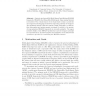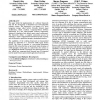10 search results - page 2 / 2 » General Principles of Learning-Based Multi-Agent Systems |
HICSS
2003
IEEE
13 years 10 months ago
2003
IEEE
We adopt the decision-theoretic principle of expected utility maximization as a paradigm for designing autonomous rational agents operating in multi-agent environments. We use the...
HAIS
2009
Springer
13 years 9 months ago
2009
Springer
A generic and extendible Multi-Agent Data Mining (MADM) framework, EMADS (the Extendible Multi-Agent Data mining System) is described. The central feature of the framework is that ...
IIWAS
2008
13 years 6 months ago
2008
Supply chains have evolved to web-applications that tap on the power of internet to expand their networks online. Recently some research attention is focused on make-to-order supp...
ICSE
2008
IEEE-ACM
2008
IEEE-ACM
Developing a security protocol for a distributed decision support system in a healthcare environment
14 years 5 months ago
In this paper, we describe the unique security issues involved in healthcare domains. These have been addressed to the needs of the HealthAgents project. In the proposed approach,...
ATAL
2009
Springer
13 years 11 months ago
2009
Springer
This paper details the implementation of a software framework that aids the development of distributed and self-configurable software systems. This framework is an instance of a n...


